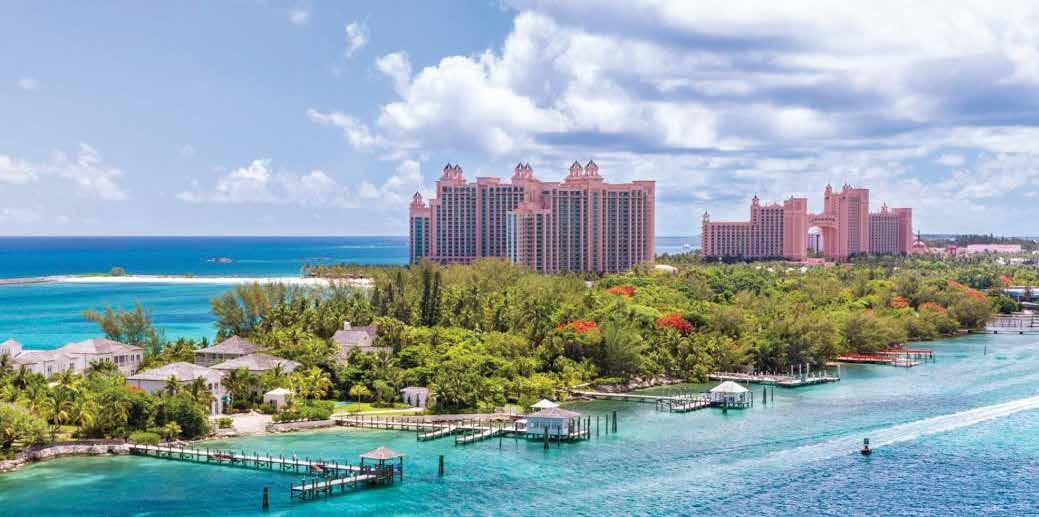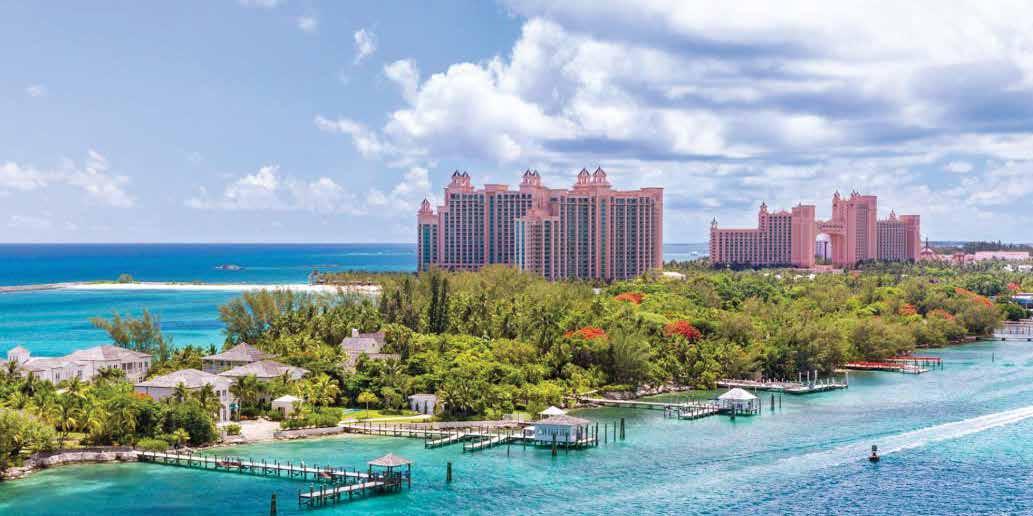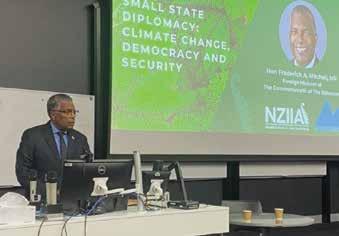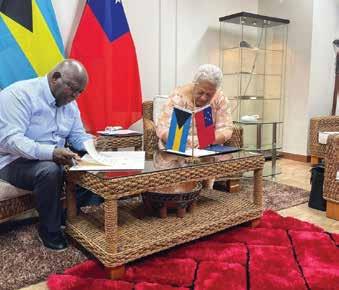
7 minute read
Small state diplomacy
Frederick Mitchell discusses The Bahamas’ approach to climate change, democracy and security.

The Bahamas, a Commonwealth member that pursues its foreign policy within a multilateral context, is a strong supporter of the United Nations. It is seeking a seat in the world body’s Security Council for the two-year period 2032–33, the election for which takes place in 2031. It is also an active member in the CARICOM group of fifteen Caribbean countries, thirteen of them former colonies of the United Kingdom, plus Haiti and Suriname. Key issues facing The Bahamas include combating the effects of climate change and securing reparatory justice for the slavery imposed on the ancestors of many of its citizens.
The Bahamas operates its foreign policy within a multilateral context. This was the foundational principle laid down by our founding Prime Minister Lynden Pindling 51 years ago when we joined the United Nations.
We, like New Zealand, are members of the Commonwealth. I determined when I first became foreign minister in 2002 that we should have diplomatic relations with every Commonwealth country and we are just now getting close to that goal. We consider New Zealand to be a friend in every respect, having co-operated in the Commonwealth context and at the United Nations.
The Bahamas is seeking a seat in the United Nations Security Council in the years 2032 and 2033 and the election takes place in 2031. We are seeking actively the support of New Zealand and this region and offer to support New Zealand in its diplomatic and trade ambitions.


The other important body in this context in which we operate our foreign policy is the CARICOM group. This is a group of fifteen countries, thirteen of them former colonies of the United Kingdom, plus Haiti and Suriname. We seek to co-ordinate the foreign policy of our countries to our mutual benefit. The number one issue for all our countries is the issue of climate change.
New Zealand has been a leader in the fight on climate change. We look forward to working with New Zealand on the issues at the COP 29, which will take place in Baku in Azerbaijan in November.
I have come here directly from Samoa. There the prime minister of Samoa, Fiamē Naomi Mataʻafa, and the prime minister of The Bahamas, Philip Davis, signed a communiqué to establish diplomatic relations between our two countries. Fiamē Naomi Mataʻafa and her people presided over a successful heads of government meeting. The two main issues at the meeting were climate change and reparatory justice for slavery and indigenous people. Having regard to the history of New Zealand, this is also a theme that I have discussed while here in New Zealand.
I had an excellent meeting on 28 October with a representative of the Māori community, Tania te Whenua, and explained some of the synergies and convergences of our shared experiences in colonialism from history and how we can learn from each other on these issues.
Reparations fight
In the Caribbean, we are engaged in a fight for reparatory justice arising out of the millions of African slaves who were brought forcibly to the Caribbean during the centuries from 1400 to the 1800s. It is believed that 3 million slaves were brought to the Caribbean by the British and millions more to the Americas. It is now widely acknowledged that this was a great moral wrong. Millions perished in the middle passage. The slave owners got compensation, the slaves and their dependents did not. The bonds that supported the borrowing to pay off the British government’s debt for the compensation was just paid off in 2015. There is now an argument for reparatory justice.
In The Bahamas, where the majority are the descendants of African slaves, there is no native or indigenous population or first nation. By the time the Europeans and Africans arrived, history tells us that the Spanish who visited the islands in 1492 and afterwards, had denuded the islands of their populations and left them barren of inhabitants. In 1648 then when the British settlers arrived, fleeing religious persecution in Bermuda, there was no one there or so history tells us. The society then began in its present incarnation.
The descendants of African slaves became the majority of the population after the war of independence that created the United States. Loyalists to the British crown were expelled from the United States and moved to the Bahamas to take advantage of the land being offered in generous grants for their loyalty. They implemented a system of apartheid both in law and later by social practice. From 1648 through 1782, there followed a period of slavery, and a social construct which was not set aside until what we call Majority Rule on 10 January 1967. Majority Rule Day marks the first time that an African-led administration governed The Bahamas. Slavery was abolished in 1834. Today, we are a modern democratic state, but we suffer the dysfunctions of the legacy of slavery and under-development.
We face an existential threat of climate change with 80 per cent of the land in The Bahamas being within one metre of sea level. But we have faith that we can overcome all of these obstacles and difficulties through working together and what better place than to start right here in New Zealand. I think of this visit as establishing a beachhead for The Bahamas. We hope that this will be the beginning of another chapter in a beautiful friendship. We are actively seeking someone who can be an honorary consul, to look after our interests here.
Collaborative opportunities
We see tremendous opportunities for collaboration with New Zealand and the Pacific Islands nations. We share similar challenges and can learn from each other’s experiences. We can work together to advocate for climate action, strengthen democracy and promote peace and security in our regions and reparatory justice. I commend New Zealand’s on-going work in supporting Pacific Islands nations to address the current impacts of climate change and to build resilience against the challenging future it promises.
As we face these global challenges, strong partnerships are essential. The Bahamas and New Zealand, though geographically distant, are close in our shared values and commitment to the Commonwealth. Our diplomatic ties, formalised in this century, are a testament to this connection. I want to thank High Commissioner Linda Te Puni for her dedication to strengthening our regional bonds. We look forward to welcoming her to Nassau. New Zealand’s engagement in the Caribbean, particularly on SIDS issues, is invaluable. We share a commitment to a rules-based international order, multilateralism and sustainable development.
We recognise New Zealand’s deep ties with the Caribbean, spanning culture, sports and the Commonwealth. We see opportunities to expand our collaboration in areas like climate resilience, trade, renewable energy and disaster preparedness. The CARICOM Development Cooperation Arrangement is a key part of this.
The challenges we face demand innovative solutions and joint action. We invite New Zealanders to visit The Bahamas, experience our culture and witness the beauty and fragility of our precious islands firsthand. We encourage research partnerships with the University of The Bahamas’ Small Island Sustainability Centre, a hub for finding practical solutions for island nations. Our aspiration is a world where all nations, big and small, work together to solve common problems.
Hon Frederick A. Mitchell MP has been the foreign minister and minister of the public service of The Bahamas since 2021, his third stint in the office having previously served from 2002 to 2007 and 2012 to 2017. This article is the edited text of an address he gave at the University of Auckland on 29 October 2024.






